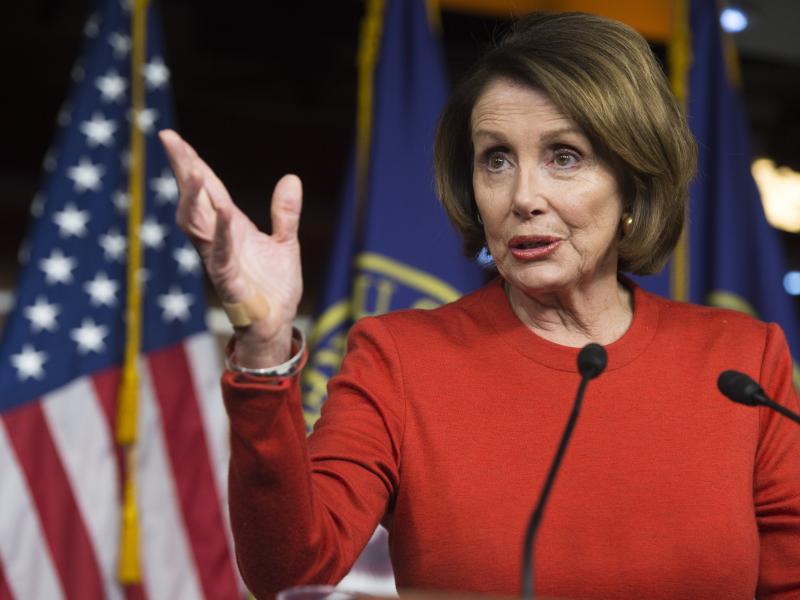
As I predicted back in March, Democratic House Leader Nancy Pelosi played an outsized role in the special elections held in GOP-leaning seats this spring. Republicans pounded the Atlanta airwaves in the GA-06 special election with thousands of ads attacking Democrat Jon Ossoff, who positioned himself as a moderate and a centrist, as a puppet for Pelosi’s “liberal agenda.” According to the ad tracking firm Kantar Media CMAG, there were 4,653 anti-Pelosi ads run between April 19 (the start of the run-off) and the June 20 election, at a cost of approximately $4.7 million.
Republicans see Pelosi as the gift that keeps on giving. Universally known and deeply disliked and distrusted among GOP voters, she’s an easy and reliable foil. Said one long-time House GOP strategist to me in the wake of the Republican victory in Georgia: “I'd put Pelosi up anytime against any issue because it is so hardened in voters’ minds what [she] stands for—what she means for America—and it is totally out of sync with suburban, economic-driven voters.”
And, the dislike of Pelosi isn’t limited to Republicans. A number of Democrats took to Twitter in the immediate aftermath of the GA-06 loss asking whether the party should put a new, less controversial leader in place. Joe Cunningham, a Democrat running against South Carolina GOP Rep. Mark Sanford, announced (via Twitter) that “The Democratic Party needs new leadership now. If elected, I will not vote for Nancy Pelosi for speaker.” Plenty of other Democrats–especially those running in conservative or GOP leaning seats–are going to be asked about their fealty to the Democratic leader. Some may supply the same answer as Cunningham
A number of Democratic incumbents also vented their frustration on Wednesday and Thursday. “I think you’d have to be an idiot to think we could win the House with Pelosi at the top,” Rep. Filemon Vela (D-Texas) told POLITICO. “Nancy Pelosi is not the only reason that Ossoff lost. But she certainly is one of the reasons.”
Before DC starts the next round of breathless speculation about what the loss in GA-06 means for Pelosi’s future, let’s take a deep breath and really think this through.
- Pelosi matters until she doesn’t. Midterm elections are a referendum on the party in power, not the party out of power. Pelosi’s been a reliable and effective weapon against Democrats in swing/conservative districts for the past few years. But, for the first time since 2009 her party is completely shut out of power. Republicans now control the House, Senate and the White House, and they are going to have to defend what they did – or didn’t – do next fall. However, we’re only six months into the new Administration and Congress. For most voters, it’s simply way too early to judge the success or failure of a GOP-led Washington. By this time next year, it won’t be.
Many Democrats have complained that the party needs to show voters what they stand for not just what they stand against. Sure. But, and I know I sound like a broken record here, it’s still very early! Who knows what we are going to be talking about or dealing with a year and a half from today. Yes, Democrats need to have a clear and compelling message. But, it will also be driven by their reaction to and alternatives for legislation the GOP has offered or passed.
- Shaking up Democratic leadership will be more destabilizing than edifying. There’s no serious effort forming to oust Pelosi or rearrange the leadership. Democrats had the chance to replace Pelosi earlier this year. They didn’t. To throw her overboard now would only cause internal division and rancor.
- The bigger worry for Democrats in 2018 is intra-primary fighting that either saps money and energy that could be better spent aimed at the GOP and/or results in the “wrong” candidate emerging in a primary. A candidate who has significant baggage that can be exploited by the GOP. Or a candidate whose views and/or voting record are dramatically out of step with the district.
Twenty-four seats shy of the majority—and with no room for error—Democrats simply can’t afford to have a bunch of damaged and/or financially strapped candidates as their standard-bearers in 2018. If Democrats want to do more than hand-wringing, they should be focusing less on the rearview mirror and more on the windshield.
In this deeply polarized, increasingly tribal political environment, it’s getting harder and harder for individual candidates to separate themselves from their party—or their party leaders. If Trump and the GOP are either moderately popular or moderately unpopular next fall, attacks on Pelosi may be all they need to get their partisans to come “back home” and support them. But, if things go really south—like we saw in 2006 for Republicans when they were burdened with an unpopular war, a scandal-plagued Congress and a botched handling of Hurricane Katrina—bashing Pelosi may not be enough to convince weary and wary soft Republicans and independents to stick with the GOP team.

Subscribe Today
Our subscribers have first access to individual race pages for each House, Senate and Governors race, which will include race ratings (each race is rated on a seven-point scale) and a narrative analysis pertaining to that race.